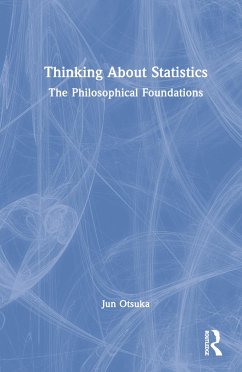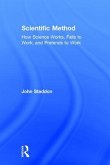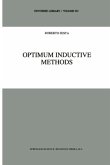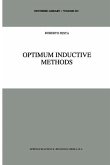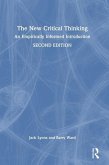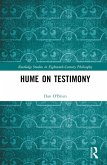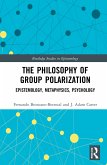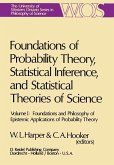Simply stated, this book bridges the gap between statistics and philosophy. It does this by delineating the conceptual cores of various statistical methodologies (Bayesian/frequentist statistics, model selection, machine learning, causal inference etc.) and drawing out their philosophical implications.
Hinweis: Dieser Artikel kann nur an eine deutsche Lieferadresse ausgeliefert werden.
Hinweis: Dieser Artikel kann nur an eine deutsche Lieferadresse ausgeliefert werden.
"Statistics are being used ever more widely in AI, climate studies, medicine and other areas. Yet they are hard to understand both mathematically and conceptually. Jun Otsuka has the answer to this problem. He has a remarkable ability to explain statistical techniques clearly and accurately with a minimal use of mathematics. At the same time he gives lucid discussions of why they work. He deals not only with the long-standing controversy between Bayesianism and classical statistics, but also with such recent topics as causality and deep learning by computers. His book is the perfect guide to those perplexed by statistics." -- Donald Gillies, University College London
"Otsuka's excellent book is mostly organized around the idea that different statistical approaches can be illuminated by linking them to different ideas in general epistemology. Otsuka connects Bayesianism to internalism and foundationalism, frequentism to reliabilism, and the Akaike Information Criterion in model selection theory to instrumentalism. This useful mapping doesn't cover all the interesting ideas he presents. His discussions of causal inference and machine learning are philosophically insightful, as is his idea that statisticians embrace an assumption that is similar to Hume's Principle of the Uniformity of Nature." -- Elliott Sober, University of Wisconsin-Madison
"Otsuka's excellent book is mostly organized around the idea that different statistical approaches can be illuminated by linking them to different ideas in general epistemology. Otsuka connects Bayesianism to internalism and foundationalism, frequentism to reliabilism, and the Akaike Information Criterion in model selection theory to instrumentalism. This useful mapping doesn't cover all the interesting ideas he presents. His discussions of causal inference and machine learning are philosophically insightful, as is his idea that statisticians embrace an assumption that is similar to Hume's Principle of the Uniformity of Nature." -- Elliott Sober, University of Wisconsin-Madison

